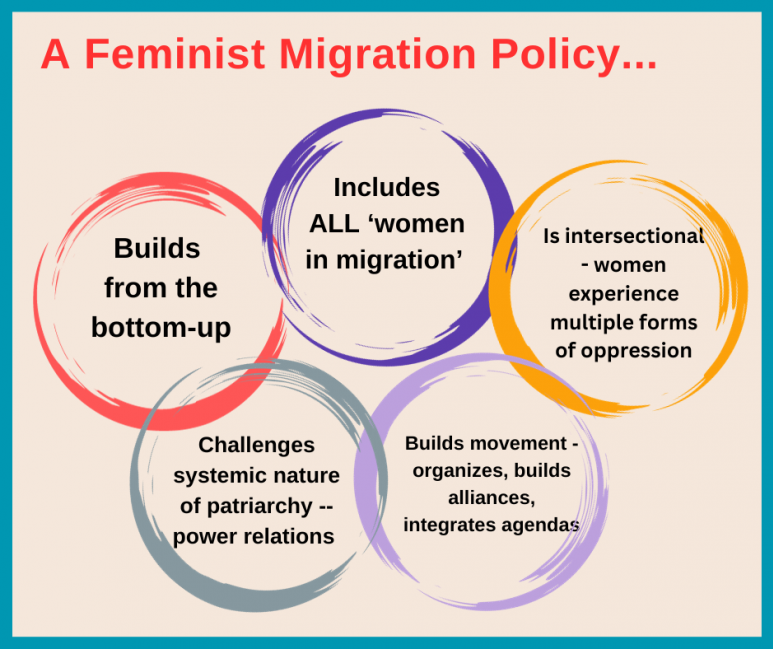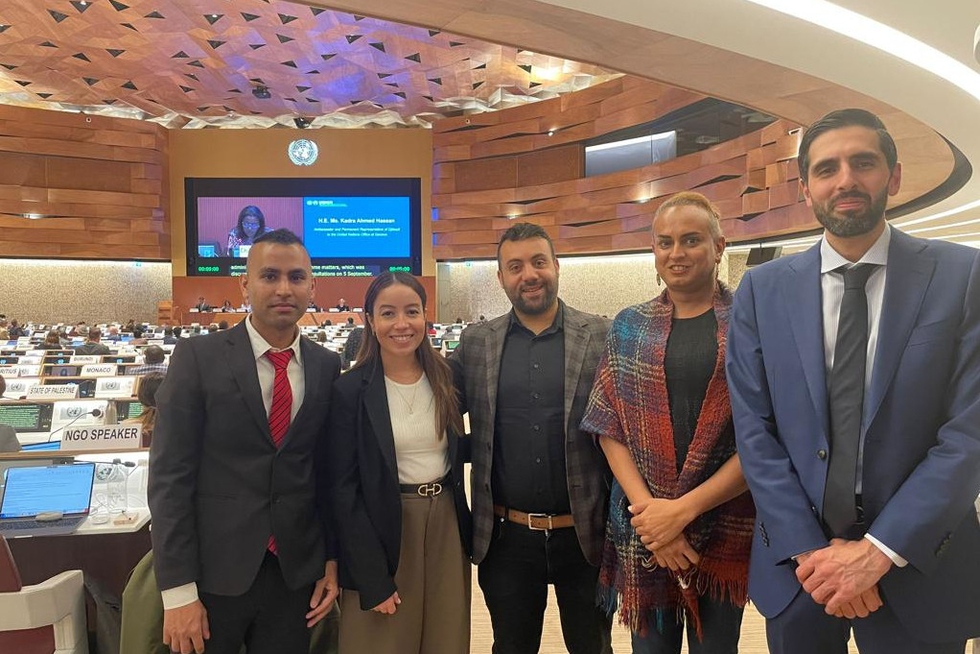'Gender-responsive' is Not Enough

Over the last decade, there have been many good intentions and some significant policy gains when it comes to addressing gender and migration. However, in much UN member state discourse, good intentions consistently conflate women and children in one phrase and see migrant women primarily as victims. Migrant women are instrumentalized as assets for development–through their labor and remittances–without recognizing their human rights. Women are infantilized, seen as needing 'protection' through restrictive migration laws that actually make their journeys more dangerous. The concerns of women in migration, in all their diversity, are viewed as an add-on, a box to check, as if merely mentioning them is sufficient to address their needs. The policy gains are reflected in the UN Global Compact for Safe, Orderly and Regular Migration (GCM). Women in Migration Network (WIMN) played an active role in the Compact negotiations, working with civil society colleagues and member states to push gender as a cross-cutting principle also reflected in Compact objectives. At the approval of the Compact in 2018, WIMN and Oxfam International unveiled the Marrakech Women’s Manifesto, celebrating these gains while recognizing the ongoing limitations. However, at the first UN International Migration Review Forum (IMRF) in 2022, the Progress Declaration only mentioned women and children here and there, failing to bring a holistic approach impacting every aspect of the Compact, migration and national policy.
Advocating for Gender as a Cross-cutting Principle
As an international network addressing gender and migration, we began thinking about the hard-won gains and the welcome commitment of a growing number of member states to explore both gender-responsive migration policy and Feminist Foreign Policy. These are much-needed steps in the right direction, and we salute these government commitments. At the same time, 'gender-responsive migration policy' has itself become a catch phrase. Real policy changes are needed to ensure women’s rights. For many women in migration, things are worse.
- When people from Central America disappear on the migrant journey north, women are at the forefront of the struggle to find them. Cooperation to identify missing migrants is a feminist issue and requires regional policy responses that put women's concerns and leadership first.
- When women lose livelihoods due to climate change–from drought to flooding, loss of fishing shoals, to rising waters or storms–they move to urban settings to seek work, or become heads of households when partners migrate, or migrate across borders. Their need for regular migration and work status is a feminist issue. Women’s particular roles in an economy and their added burdens as family caregivers all pose additional challenges.
- When women migrate to Gulf Cooperation Council (GCC) countries through temporary work permits as domestic workers, they often face intense exploitation and abuse, isolated in private homes with visas tied to their employers. They have limited or no right to socialize, organize or seek redress. Those who return home are often stigmatized and face difficulty finding decent work. Migrant workers’ rights are a feminist issue.
Towards an Intersectional Feminist Migration Policy
We need a bottom-up, intersectional feminist migration agenda shaped by women in migration. That is a mouthful. What does it even mean?
- By feminist, we aim to address the systemic nature of patriarchy in all institutions, through intersectional practice. This is about understanding power dynamics and challenging power inequalities at all levels. Feminism must address the systems that create inequality–not only between women and men, but also among nations.
- By intersectional, we recognize that women experience multiple forms of oppression, particularly but not limited to race, class, gender, sexual orientation, gender identity, and migratory status. These are not add-ons in an identity check list, but intersecting realities that shape women’s lives.
- By 'women in migration', we include migrant women, girls, and transgender migrants; those who have migrant families; who have missing relatives; who seek to avoid displacement from their communities, and those who have returned to their country of origin, among others. The voices and leadership of those directly affected by specific concerns must shape national and global agendas; their leadership is essential.
This approach means that 'gender-responsive' migration policy is not enough. Migration policy demands a comprehensive context including foreign policy positions, development aid, investment, tax policy, foreign debt, trade policy, global health and climate policy. This approach invites member states and other stakeholders to ask:
- How is a situation experienced differently by women, LGBTQI+ migrants, young women, racialized women?
- What policies need to be put in place to protect the rights of these groups?
- What policies are needed to address the roots of the issue?
- How is violence, including by state actors, being addressed at all levels?
- What policies will recognize women’s wisdom, insights and leadership and create spaces for their voices?
Domestic policy needs to ensure migrants’ access to quality public services that pay living wages to providers and social protections. Caregivers in destination countries, often migrant women of color, must have their work valued by recognition of domestic work as work--by paying living wages and benefits, by setting limits to the workday, and by addressing gender-based violence in the world of work.
There is much discussion about how we 'change the narrative' regarding migration–from one that sees migrants, especially the undocumented, as a threat--to one where migrants are embraced as part of the community, equally entitled to rights. Yet, even the most creative media campaigns fail to address the fears of those who feel displaced. Domestic policy needs to address citizens’–and noncitizens’–concerns for good jobs, housing, services and futures for their children. If not, 'us vs. them' becomes the default setting. The fear that 'they' might get something 'we' do not have can only be addressed by guaranteeing economic and social rights for all. That is a feminist demand.
Priority Concerns regarding Feminist Migration Policy
At WIMN’s Member Assembly in late 2023, members affirmed priority concerns regarding feminist migration policy, including: assurance of human and labor rights; human rights-based and gender-responsive pathways for regular migration; ending race-based discrimination and gender-based violence; looking at economic and social systems that perpetuate inequality; dismantling white supremacy and colonial relationships; ensuring reproductive and sexual rights; ensuring social protections; ending migrant disappearance, practices of family separation and detention; and decriminalizing sex work.
WIMN members emphasized that the process is as important as the emerging agenda. We need language justice to listen to women in migration in many languages. We need to create opportunities to hear and include their concerns. We need leadership development to connect local realities and organizing to national, regional and global policy spaces so that directly affected women are in the room to name their issues. We need to build the agenda collectively. And we need to engage with allies across movements to strengthen our collective vision and advocacy. This is the work the Women in Migration Network is engaged in. We invite all stakeholders to join us in moving from “gender-responsive” to truly integrated and comprehensive feminist migration policy.
About Women in Migration Network
Women in Migration Network (WIMN) is an international network focused on the rights of women in migration. WIMN creates and promotes human rights-based and feminist global migration policies in an era dominated by economic, social and political inequities and hostile systems towards people in migration. WIMN members are organizations and individuals working at the national, regional and international levels, advocating for women, migrant, human rights, and labor rights.
The opinions and statements of the guest author expressed in this article do not reflect the position of the Friedrich-Ebert-Stiftung.




